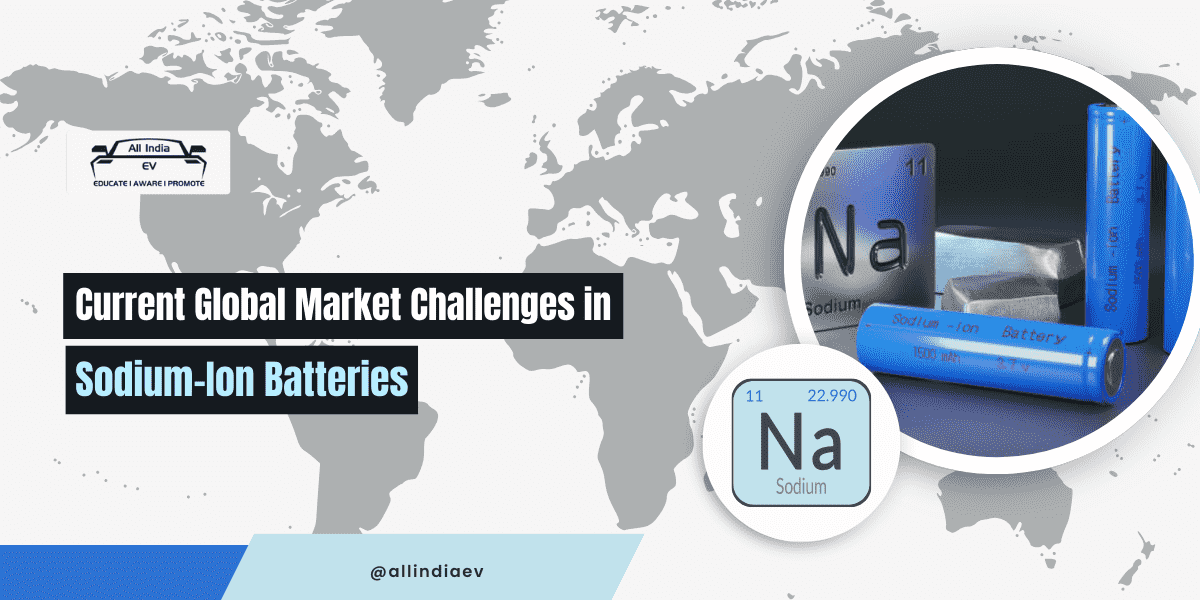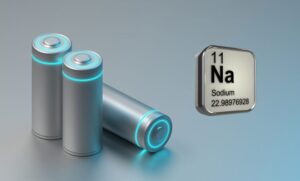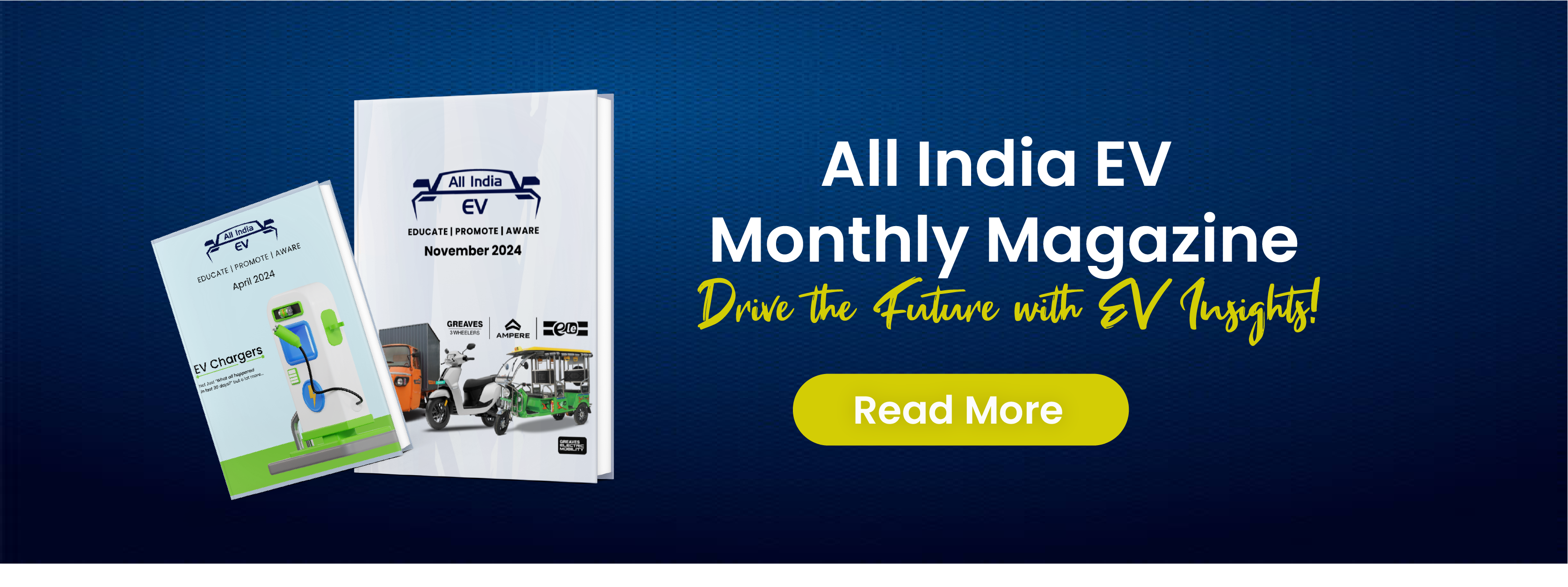
Challenges facing the Sodium-Ion Battery market: Cost and Scalability issues, and Key companies driving innovation in EV technology
Sodium-ion battery (SIBs) is gaining attention as a promising alternative to lithium-ion batteries, which currently dominate the energy storage market. Unlike lithium, sodium is more abundant and widely distributed across the globe, offering a more sustainable and potentially less expensive option for battery production. Sodium-ion batteries operate similarly to lithium-ion batteries, using sodium ions as the charge carriers.
In the context of electric vehicles (EVs), sodium-ion batteries present a viable solution to some of the critical issues facing the current lithium-ion technology.
The increasing demand for EVs is driving the need for scalable, cost-effective, and environmentally friendly battery technologies. Sodium-ion batteries could reduce reliance on scarce lithium resources and mitigate the environmental impacts associated with lithium extraction and processing. Additionally, sodium-ion batteries have the potential to offer competitive performance in terms of energy density and cycle life, making them a key player in the future of sustainable energy storage.
As the EV market continues to expand and the global push for renewable energy intensifies, sodium-ion batteries are poised to play an increasingly important role. While the technology is still in the developmental stage, ongoing research and investment are driving rapid advancements, positioning sodium-ion batteries as a critical component in the transition to cleaner, more sustainable energy systems
Current Global Market Challenges in Sodium-Ion Batteries
Cost Competitiveness: Sodium-ion batteries are not yet cost-competitive with lithium-ion batteries. Although sodium is more abundant and less expensive than lithium, the overall cost of producing sodium-ion batteries remains high due to the need for specialized materials and manufacturing processes. This includes the development of high-performance anodes and electrolytes, which are currently more costly and less efficient compared to those used in lithium-ion batteries. Overcoming this cost barrier is crucial for sodium-ion batteries to gain market traction, especially in price-sensitive applications like electric vehicles (EVs) and large-scale energy storage systems.
Performance Limitations: One of the major technical challenges with sodium-ion batteries is their lower energy density compared to lithium-ion batteries. Sodium ions are larger and heavier than lithium ions, which results in reduced storage capacity and efficiency. This lower energy density limits the application of sodium-ion batteries in high-performance settings, such as EVs, where energy density is a critical factor. Although research is ongoing to enhance the performance of sodium-ion batteries, significant advancements are needed to close the gap with lithium-ion technology.
Manufacturing and Scalability: The sodium-ion battery industry is still in its infancy, and the infrastructure for large-scale production is underdeveloped. While companies like BYD and others are investing in sodium-ion battery gigafactories, the current manufacturing processes are not as mature or streamlined as those for lithium-ion batteries. This lack of established manufacturing capabilities presents a barrier to scaling production to meet global demand, particularly in the face of increasing competition from other battery technologies.
Supply Chain and Material Challenges: While sodium is abundant, other materials critical to sodium-ion batteries, such as cathode materials (e.g., layered oxide materials), are less common and can be difficult to source at scale. Additionally, the supply chain for these materials is not as well-established as that for lithium-ion batteries, leading to potential bottlenecks in production. The development of a reliable and sustainable supply chain is essential for the long-term viability of sodium-ion batteries in the global market.
Regulatory and Standardization Issues: The sodium-ion battery market lacks the regulatory framework and standardization that exists for lithium-ion batteries. This can create uncertainties for manufacturers and end-users, especially in terms of safety, performance standards, and compatibility with existing infrastructure. Establishing clear regulatory guidelines and industry standards will be critical for building confidence in sodium-ion technology and encouraging broader adoption.
Key Global Companies in Sodium-Ion Battery Research for EVs

Contemporary Amperex Technology Co. Ltd. (CATL) – A major Chinese battery manufacturer, CATL is leading the charge in sodium-ion battery research and has announced plans to begin mass production of sodium-ion batteries for various applications, including electric vehicles.
Faradion Limited – Based in the United Kingdom, Faradion is one of the pioneers in sodium-ion battery technology. The company is working on developing high-performance sodium-ion batteries that could be used in electric vehicles and other energy storage applications.
HiNa Battery Technology Co., Ltd. – This Chinese company is focused on advancing sodium-ion battery technology for both electric vehicles and grid storage solutions. HiNa has been active in creating partnerships to scale up the production of sodium-ion batteries.
Natron Energy – Based in the United States, Natron Energy specializes in sodium-ion batteries for industrial applications but is also exploring opportunities in the EV market. The company is known for its work on Prussian blue electrode materials, which are integral to its sodium-ion battery designs.
BYD – A leading global EV manufacturer, BYD is investing in sodium-ion battery technology as part of its broader strategy to diversify its battery offerings. The company is building a gigafactory dedicated to sodium-ion batteries, reflecting its commitment to this emerging technology.
AMTE Power plc – A UK-based battery manufacturer, AMTE Power is exploring sodium-ion batteries for automotive applications. The company is known for its focus on creating specialized, high-performance batteries for niche markets, including EVs.
Aquion Energy – Although primarily focused on stationary energy storage, Aquion Energy has developed sodium-ion batteries that could potentially be adapted for use in electric vehicles. The company is recognized for its sustainable and non-toxic battery solutions.
Sodion Energy – This company is another key player in the sodium-ion battery space, working on innovative battery technologies that could find applications in electric vehicles. Sodion Energy is part of a growing ecosystem of companies aiming to commercialize sodium-ion batteries for broader use.
Moving ahead….
Sodium-ion batteries present a promising alternative to lithium-ion technology, especially in the context of electric vehicles (EVs) and large-scale energy storage. However, their widespread adoption is currently hindered by several challenges, including cost competitiveness, performance limitations, and manufacturing scalability. The cost of production remains high due to the specialized materials required, and their lower energy density compared to lithium-ion batteries restricts their application in high-performance scenarios. Moreover, the underdeveloped manufacturing infrastructure and supply chain complexities add further hurdles to their market penetration.
Despite these challenges, the strategic importance of sodium-ion batteries in the future of EVs cannot be overstated. They offer the potential for a more sustainable and cost-effective solution, particularly as global lithium resources become increasingly strained. Key industry players such as CATL, Faradion Limited, BYD, and others are at the forefront of overcoming these obstacles. Through continuous innovation, investment in gigafactories, and advancements in material science, these companies are driving the sodium-ion battery market forward, paving the way for broader adoption in the EV sector.
The efforts of these companies are crucial in addressing the current challenges, and their success will determine the role sodium-ion batteries will play in the future of energy storage and electric mobility. As research and development progress, and as the market infrastructure matures, sodium-ion batteries could become a key technology in the transition to sustainable energy solutions.

